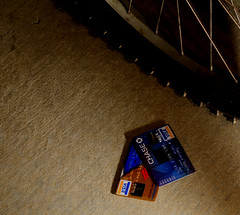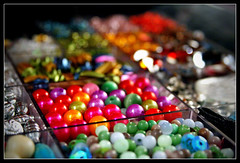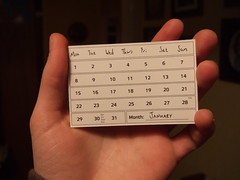Everytime you buy something with packaging, you're buying something only to throw away. Sounds crazy doesn't it but it's true. And for everything you have to throw away you also have to pay the council to come and take it away too so you're getting a double whammy against your wallet right there.
Think about it. You buy a six pack of yoghurts, or maybe a one litre container, and where does the packaging end up. That's right, in the bin. So firstly, you paid for the plastic to make the container and secondly you're having to pay to take it away again! (Unfortunately where I live, the council doesn't recycle that kind of plastic, so it has to be thrown out.)
That was just one example, but let's look at some others and some possible solutions.
1) Replacing 'Use Once' Kitchen Paper with Multi-Use Cloths
Back in October, I realised that I used a lot of kitchen paper. Usually because I use it for the cat's bowls so I don't have to use my normal tea-towel. I don't have a huge amount of space in my kitchen so I prefer to have as few things as possible in there. Then I read an article which made me wonder why I was doing this.
Two months on, I'm just about running out of kitchen paper and last weekend I bought 4 facecloths (30% off of course) of about the same size as kitchen paper to be used instead. So let's look at the maths.
Two rolls of kitchen paper lasted me around two months. At about $1.50 per roll, that'd be something like $18 over the space of a year. The 4 facecloths I bought cost me a grand total of $5.54, just a bit below four rolls of paper towels. Each paper towel roll has 80 sheets, but these cloths will keep going for years. In fact, within less than 4 months the facecloths (now multi-use-cloths) will have paid for themselves.
Let's add to the equation that paper towels add to your waste even if this is insignificant. Ok, to be fair, I will have to wash the cloths every now and again (dependent on function) but this won't add up too much either. Certainly not as much as $12 in the first year and $18 for every subsequent year. Overall I'd say this was well worth it, not just because of money but for reducing waste too. Remember the paper towels also come in plastic bags whilst the tea towels just had a small paper tag.
2) Not Accepting Plastic Shopping Bags
No matter what you think about free plastic bags, whether you use them for lining your bin or otherwise, you still have to pay for them in one way or another. Usually they are counted as overhead for the shop so it's almost like everyone has to pay a 'plastic bag tax' when shopping at that particular store.
This 'tax' can be easily avoided by shopping at places which charge for giving out plastic bags. Therefore, only the people who use them have to pay for them. I presuming here that you won't pay for them because you're cleverer than that and instead use re-usable bags.
I myself have two cotton bags which I try and use every time I head to the supermarket. I must admit, every so often I forget and have to unwillingly take a bag but every time it makes me feel sad so this is something I really need to fix and stop doing.
An example of a place in New Zealand which charges for plastic bags is Pak'n'Save. They even advertise the fact that they charge for them to keep prices lower for everyone. Good on you Pak'n'Save! Unfortunately I believe all the other supermarkets still give out free bags, which is crazy because they also try and sell reusable plastic ones too! Let me know if you know of other stores here in NZ which also charge.
(Side note: when I was in the UK back in 2001, one of the supermarkets, Sainsburys', used to give me money every time I used a bag of my own! Granted, it was only 1p but forward thinking such as this innovative and also proof of the plastic bag tax.)
3) Composting your Organic Material
Almost every bit of your organic material can be composted and again this helps in many different ways. Firstly, your volume of waste reduces and therefore lowers the amount of money you spend having it taken away. Secondly you can use the compost on your garden the following year to create a rich soil in which to grow your vegetables - another source of food at a lower cost to you.
Finally, composting also prevents the organic material from going to the tip, in which conditions, instead of breaking down aerobically (with oxygen) it breaks down anaerobically (without exygen) and produces methane. In some landfills this is captured and used as an energy source but in most cases it leaks out into the atmosphere and is a significant contributor to the greenhouse effect.
What not to compost also helps when deciding whether something belongs in the compost or the rubbish bin. You'll have to figure out which plants are classed as weeds in your local environment since I think that article was written for a North American audience.
Even if you don't have a compost heap, you can (and should) just throw your organic waste onto your land anyway so that it can decompose naturally. This is something I had not heard about before, though it makes perfect sense and seems to be called Passive Composting. Quite a few things to gain for not that much work.
4) Shop Around the Outside of the Store
The science of laying out a supermarket is very well known to make shoppers buy impulsive purchases. Those tempting and scrumptious chocolatey or sweety things (as well as other fast but processed food) are all laid out in the thin aisles in the middle of the store. When you're stuck in a trolley-jam in the middle, your eye gets tempted by all those processed foods.
Generally you don't need these items but sometimes you want them. That right there should stop you buying them since they are a want, not a need. That's the first reason not to shop in the middle of the store and to limit your trip to around the outside.
But think about this too. Not only do you not need many of those items, you're also not even getting value for money since most of these things come in layers and layers of packaging. Take a simple block of chocolate. It is firstly covered in metal foil, then has a paper sleeve. A packet of individually wrapped sweets has got to be one of the worse culprits (think individually wrapper foil, with a sticker on, stuck to a frilly cup, all enclosed in further plastic). Even something better like a jar of pickle means you're paying for the jar and lid.
Next, think about the items of food which are better for you, especially the fruit and veg. I rarely use any bags in that section and instead put my purchases directly into the basket and then directly into my cotton bags at the checkout. Occasionally I think the cashier is a little annoyed since individual tomatoes can be trickier to handle than a bag but in reality, that doesn't bother me too much. Bananas are cool since they come in their own packaging and one which can also be recycled!
In reality this point doesn't always hold true (milk cartons for example) but the majority of items in the middle of the supermarket have an excess of packaging you just don't need. Also remember that when you do need something, buying in bulk also helps reduce your waste per unit item if this item can't be avoided.
5) ... and Back to Those Yoghurt Pots
In September, I was buying those 6 packs of yoghurt for around $3.00 when they were on special. (I refused to pay the normal astronomical price of over $5!) One week when none of the brands were on sale, I progressed onto buying a one litre container for around $3.50. It had less plastic (by my unprovable calculation) and more yoghurt per 100g than the multipacks. In both circumstances, I was still throwing away a fair bit of plastic.
Recently, I have taken my yoghurt maker out of retirement. I bought it a few years ago ($20) and stopped using it, mainly for the fact that my supermarket (New World) was charging over $3.50 for a packet which makes one litre. Ignoring the packaging for now, that in itself didn't make financial sense to me and more especially so since I think the normal yoghurt is a little nicer.
It turns out that after speaking to a friend of mine, the other brand of make-it-yourself yoghurt can also be used in my maker - and why I didn't think about this before, I don't know. Also, the Pak'n'Save (to which I shall now be making regular bike trips) was selling that brand for around $2.50. Overall a $1 saving on sale yoghurt and probably about $3 on regular priced yoghurt. In fact, it's nicer than the other make-it-yourself brand too. I usually go through just over one of these yoghurts a week, so within year one, I'll be saving over $30 and over $50 annually after that.
And did I mention that the packets the yoghurt comes in are just thin packets which scrunch up into a small ball. They take no space at all and could probably fit 100 of them into one of the one litre containers above. Yet another saving on waste collection.
You should also try it and see how it goes. You'll find that a bit of pre-planning means that you can make that yoghurt (12 hours wait), chill it and have it on the table ready whenever you need.
The Challenge is On!
This post was inspired by a challenge I read about a few weeks ago. EnviroMom blogged about the One Can a Month Challenge which I think means, in non-US terms, one trashcan/bag a month.
As I mentioned earlier, I have already noticed that the volume of waste I produce was lowering. There have also been some recent changes (such as the yoghurt and paper towel techniques) which will also reduce my waste levels and there are still some things I want to try to reduce it even further.
In trying out this challenge I decided to start when I last put out a bag for collection. That was two weeks ago and already I can see an improvement. In fact, I haven't even put my kitchen bin into the outside bin yet and usually it takes two of those for a full bag.
So far so good. I would say wish me luck but with these techniques, I won't need it!
Why don't you trial 'One Can a Month' and see how you go. Let us know how you get on or if you're already doing it.













